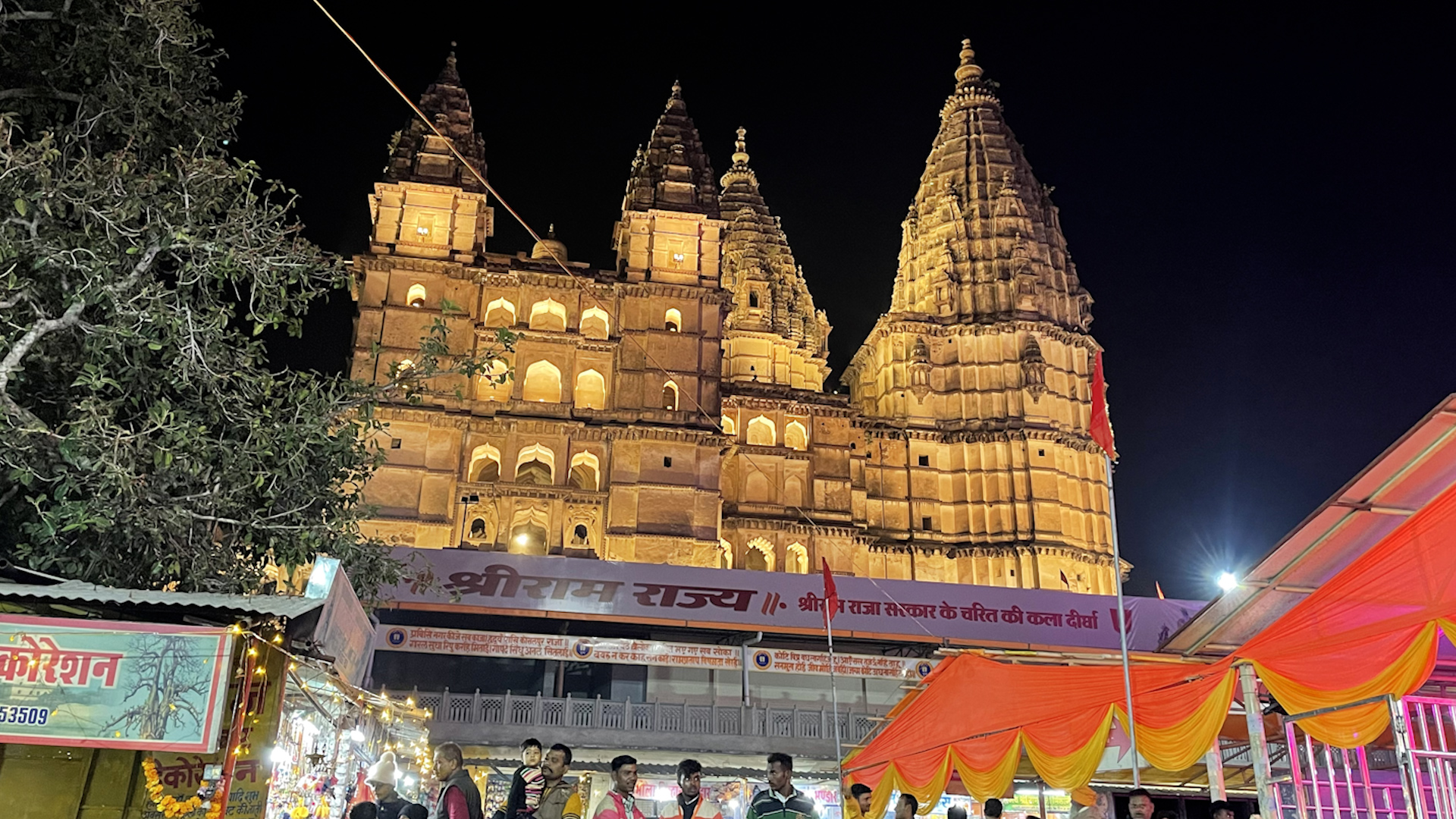ORCHHA (MADHYA PRADESH): Nestled on the border between Uttar Pradesh and Madhya Pradesh, the quaint town of Orchha has been teeming with a generous spread of crowd since last one week, steeped in Bundelkhand’s rich history of annual wedding of their favourite king.
The awe of bright lights worn on the old forts is grand.
And, the ASI protected site that houses the Ram Raja Sarkar Temple wants to welcome just everyone for a marriage procession.
As The New Indian team reaches the temple’s staircases, the announcement is actually that of the wedding of Lord Rama and Sita Mata. And within minutes the crowd swells from 50,000 to two lakh. The drum beats get louder. Animated men and women jive. Beads of sweat falling on foreheads of several in the breezy December are an indication of collective joy and frenzy.
“Today morning we did not open the temple like we would do daily, because we were preparing Raja Ram for his wedding,” pauses Acharya Birendra Kumar Bidua, the head priest at the temple as he narrates the excitement with this correspondent of The New Indian.
The legend of Orchha has it that here Lord Ram is first considered as King ‘Raja’ Ram and then as a God. For the uninitiated, the locals go on to explain this bit like this.
“In the 1500s, our Queen of Orchha named as Ganesh Kunwar, through her devotion, had persuaded Lord Ram to travel from his kingdom Ayodhya to Orchha which was being ruled then by Raja Madhukar. Ram appeared before her and jokingly asked her that if she wanted to take him to Orchha where she reigns, away from his kingdom of Ayodhya, will she have her king rule the place or Lord Ram? She told him that he would be King. So the King of Orchha vacated his seat to welcome the ruler of Ayodhya,” points out a local resident Sumit Orchha.
Which is why, in accordance with the local beliefs that there rules a ‘sarkar’ of Ram Raja, the Madhya Pradesh Armed Police gives a gun salute to King Ram four times in a day just as they would to any high ranking government official.
“It is customary for us to perform a gun salute for Raja Ram as here Ram is considered a King and not a God, only after the gun salute is he worshipped,” a sub-inspector Mamta Yadav of Madhya Pradesh Police tells our correspondent.
The gun salute is performed four times a day in the temple. The first one in the opening ceremony (aarti), the second when the temple closes in the afternoon for a short while as it is believed that King Ram is resting, the third one before the evening ceremony (aarti) when the temple reopens for the day and the fourth one after the final ceremony (aarti) in the night after which it is believed that King Ram returns to Ayodhya to spend the night there. The locals believe that Ram reigns over Orchha in the day and goes back to his abode in Ayodhya to rest for the night.
The excitement gets even bigger as the priests are joined by chorus of ‘Jai Shri Ram’ and Bundelkhandi local songs.
The priest again explains the marriage procession. A procession or ‘baraat’ is taken out of the temple and King Ram will be wedded to Sita in Janakpur. The event continues till sunrise when Sita is given a farewell or ‘bidaai’ in classic Hindu tradition.
“We performed an aarti at 2:00 pm and took out the procession at 6:00 pm. The initiation and the ‘teeka’ was done by our collector followed by the superintendent of police, local ministers and other guests who honoured him. The procession will reach every home in Orchha where the residents will honour Ram after which it will head straight to Janakpur,” quips Acharya Bidua as The New Indian meets him again.
From cops to women selling marigold and sweets, the fervour has gripped everyone.
“Isn’t it exciting that there is no government here except Ram’s? Ram is present here in his capacity as King. We treat Raja Ram with official government protocol here. No other politician reigns here except Raja Ram,” says a constable Jugal Kishor.
Several events are planned during a two-day extravaganza on December 9 and 10.
“Every Bundelkhandi’ waits for a year for this festival and takes part in it with pride to honour their king,” says Navneet Mishra, a devotee- resident of Niwari district, adding ‘Ram Vivah Leela’ is celebrated as “Bundelkhand’s Diwali”.
The customs and traditions in the temple are sacrosanct. No protocols have ever been broken and no concession has been given to any politician in the past.
“The rules of our Orchha Ram Raja Sarkar Mandir are very strict. Once when then Prime Minister Indira Gandhi visited Orchha in the day, she was just two minutes late. She was asked to wait till the evening to visit King Ram. In the evening, as per custom when the temple reopened, she was able to make her visit. Any VIP can visit Orchha, but the highest and biggest authority here is the Sri Ram Raja Sarkar.” proudly explains Anurag, a hotelier and tour guide in Orchha.
“Governments may come and go. Ministers may come and go. But here in Orchha, there is only one ‘sarkar’ and that is the Ram Raja Sarkar,” says Salik Ram Rai, a trader from neighbouring Jhansi, Uttar Pradesh.

